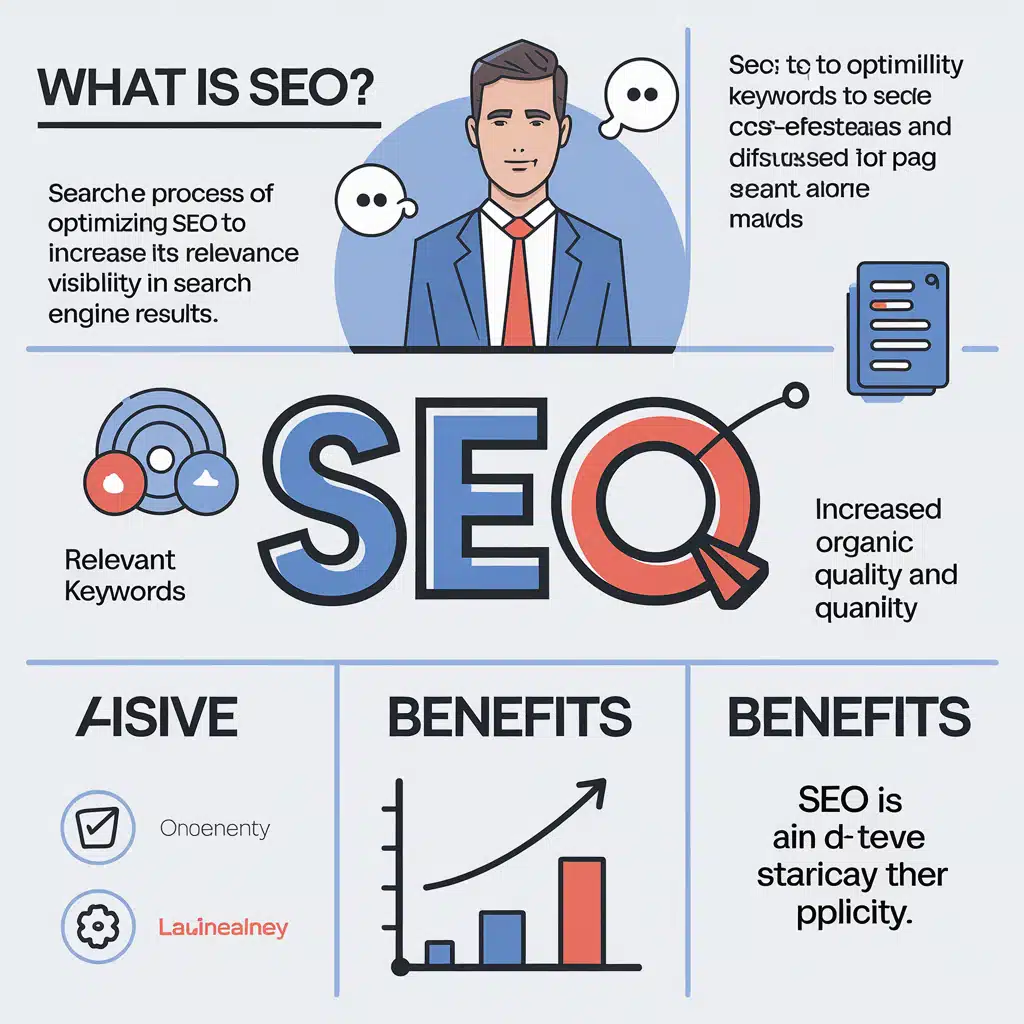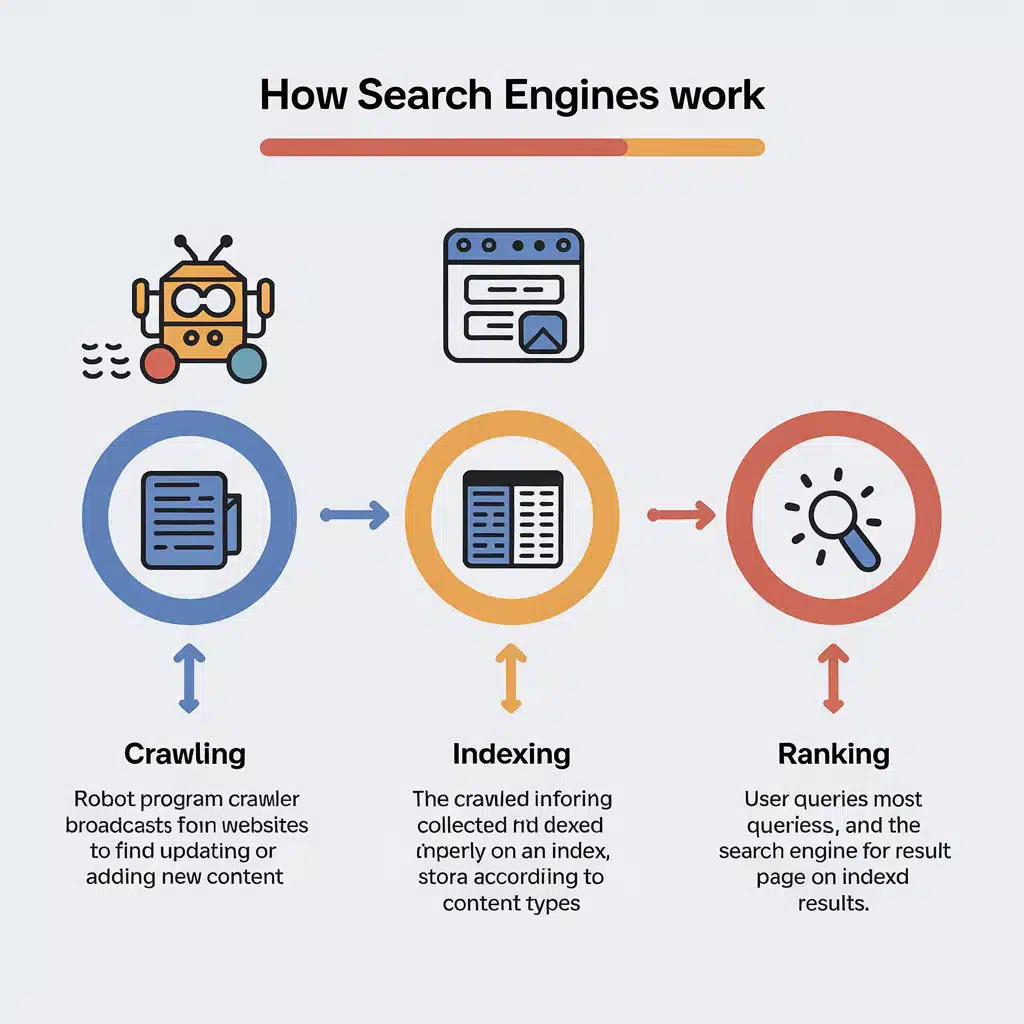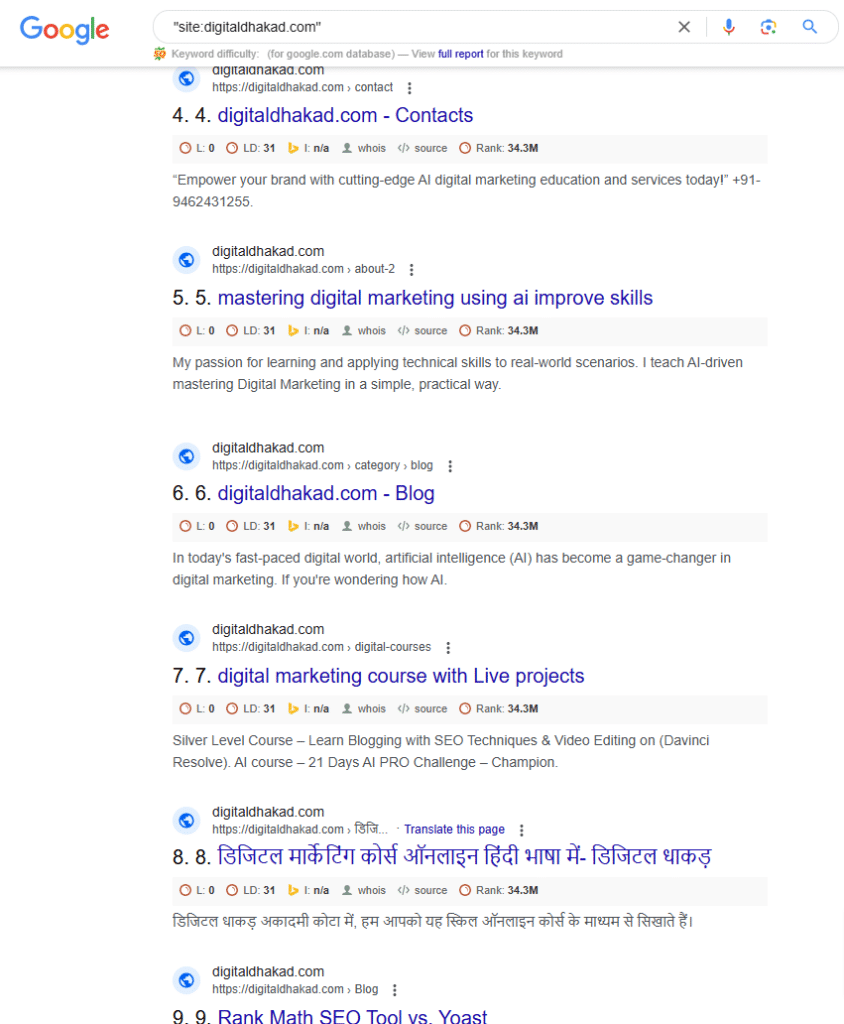What is SEO? Your Ultimate Guide to Search Engine Optimization

As you know that SEO stands for Search Engine Optimization.
It is the process of optimizing website for relevance to increase the authority and solve the user’s query.
Now we understand in simple language.
When users search on the search engines like Google, Bing, Yahoo etc through the keywords or query may be 2, 3 or 4 words. Then our website must be to users if the user are searching related to our website context products or services. If it’s showing you can say that SEO website.
For Example, website is for Car washing, if user are search “car washing near me“ or “ car washing in ‘city name’ or ‘area name’ . if user find the our website on top 1-10 results or first page. And maximum users click on the first 5 results. Paid ads also show. There is also other website related to our services. So, for it we must write context in website using those keywords which are user are searching on SE related to our service. We are here to solving the users query.
And update our services/products on citation sites or classified sites like GMB page, Just dial, Quicker, Classified in, etc. It helps to showing our services results with NAP (name, address, phone no.)
We can also write article or blog related to our services/products using keywords. (Keyword research must before writing)
Why SEO Matters: The Benefits of Ranking Higher on Google
From website SEO we get:-
- Organic or natural traffics on our sites
- Cost effective in long term
- Increase traffics on sites.
- Increase site quality and quantity.
- Increase more value in local market and goes to international.
- Get Client from anywhere
- Brand building
- Social presence increasing and many more.
SEO is long term strategy and it’s take time. You must have patients.
SEO vs. SEM: What’s the Difference?
If you’re new to digital marketing, you might have heard the terms SEO and SEM tossed around a lot. While they sound similar and are about getting traffic from search engines, they are quite different. Let’s break it down in simple terms.
What is SEO?
SEO, or Search Engine Optimization, is all about making your website better so it can appear higher in organic search results. These are the results that don’t require payment – they’re earned by providing valuable content and having a well-optimized site.
Think of SEO as planting a tree:
- You nurture it (optimize your content and website).
- Over time, it grows (your rankings improve).
- Eventually, it bears fruit (consistent, free traffic).
- Key aspects of SEO:
- On-Page SEO: Improving your website content, like using the right keywords and writing meta descriptions.
- Off-Page SEO: Building backlinks and growing your website’s authority.
- Technical SEO: Ensuring your website is fast, mobile-friendly, and easy for search engines to crawl.
The best thing about SEO? It’s cost-effective because the traffic you get is free (although it requires effort and time).
What is SEM?
SEM, or Search Engine Marketing, involves using paid ads to appear at the top of search engine results. You’re essentially paying to get noticed quickly.
Think of SEM as renting a billboard on a busy street:
- You pay for visibility (ad space).
- People notice you instantly (ads show up at the top).
- But once you stop paying, the visibility is gone.
Key features of SEM:
- Pay-Per-Click (PPC): You only pay when someone clicks on your ad.
- Targeting: Ads can be targeted to specific audiences based on location, keywords, and more.
- Quick Results: Unlike SEO, SEM works immediately but stops when the budget runs out.
How Are They Different?
| SEO | SEM |
|---|
| Free traffic (organic) | Paid traffic (ads) |
| Takes time to show results | Works instantly |
| Long-term strategy | Short-term strategy |
| Focuses on content and optimization | Focuses on bidding and targeting |
Which One Should You Use?
It depends on your goals:
- If you want long-term results and have the patience to wait, go for SEO.
- If you need instant traffic for a sale or event, SEM is your best bet.
The best strategy? Use both! SEO builds a strong foundation for free, sustainable traffic, while SEM can give your site a quick boost when needed.
Now you know the difference! Which one will you focus on first?
How Do Search Engines Work? A Simple Explanation

As you know that Google is the largest search engine in the world.
Search engines work like giant librarians for the internet, organizing and ranking billions of web pages. They use crawlers (bots) to scan websites, gather information, and store it in an index. When you search for something, the engine quickly matches your query with its indexed pages, ranking them based on factors like relevance, keywords, and quality. This process happens in seconds, helping you find the most accurate and useful results.
Let’s talk that how it works for ranking the website or page content?
It works in 3 steps which are 1. Crawling 2. Indexing 3.Ranking
First we take Crawling, Search Engine or Google has robots program or crawler to send them broadcast to find on websites for updating content or add any new content.
Second one is the Indexing, After websites crawling the Google that information which are collect during the crawling, index them properly on index store data according to types of content.
Third one is about Ranking, when user search the query on the Google through the keywords, it show the results or SERP (Search Engine Result Page). It’s depends on the content. Which are the from Google index store results are the most relevant answer.
So for website
Your website must be crawling. (for it proper site structure and sitemap )
Your website must be Indexing. (you can check from “site:domainname.com” )
Your website Must be Ranking (for it your site have engagement content.)
For best practice, you can use the Rankmath SEO tool for the WordPress website

Understanding Search Engine Crawlers: Bots in Action
Have you ever wondered how search engines like Google find your website and decide where to rank it? The answer lies with something called search engine crawlers—or as many call them, “bots.”
These bots are like little explorers of the internet. Their job is to crawl (or scan) websites and gather information about them. Think of them as librarians collecting data to organize books in a giant library—the internet!
What Do Crawlers Actually Do?
When a crawler visits your site, it looks at:
- Your Website Content: What your site is about and what keywords you’re using.
- Links: Both the links on your site and links pointing to your site from others.
- Structure: How well-organized your pages are, like if you have a sitemap or easy navigation.
The bot takes this information and sends it back to the search engine, where it’s processed and indexed (added to the library).
How Do Crawlers Find Your Site?
- Following Links: Crawlers jump from one link to another, discovering pages along the way.
- Sitemaps: If you’ve submitted a sitemap through tools like Google Search Console, crawlers use it as a map to find all your pages.
- Fresh Content: Updating your site regularly gives crawlers a reason to visit again.
Why Are Crawlers Important for SEO?
Without crawlers, your website can’t be found or ranked in search results. If a bot can’t “crawl” your site due to errors like broken links or blocked pages, it’s like a librarian not being able to find your book—it won’t be placed in the library.
How to Help Crawlers Do Their Job
Here’s how you can make life easier for these bots (and boost your SEO):
- Create a Sitemap: A clear roadmap of all your pages for bots to follow.
- Fix Broken Links: Ensure all links on your site work properly.
- Use Robots.txt Files Wisely: This file tells bots which pages to crawl and which to ignore.
- Optimize Your Website: Fast-loading pages and mobile-friendly designs help crawlers navigate easily.
Fun Fact
Did you know that not all crawlers are friendly? Some bots, like spam crawlers, can harm your site. That’s why using tools to block bad bots is just as important as welcoming the good ones like Google’s crawler!
So, next time you hear about “bots crawling your site,” you’ll know these are the hardworking little agents ensuring your website gets noticed. Treat them well, and they’ll help your site shine in search results!
FAQs
- What is the best tool for keyword research?
Popular tools include Ahrefs, SEMrush, and Google Keyword Planner. - How long does it take to see SEO results?
Results typically take 3-6 months, depending on competition and strategy. - Is it possible to do SEO without a budget?
Yes, using free tools like Google Analytics and Search Console, you can achieve good results. - Can AI tools replace SEO experts?
AI tools assist but cannot replace the strategic expertise of SEO professionals. - What are the latest trends in SEO?
Voice search optimization, mobile-first indexing, and AI-driven analytics are trending.
Thanks for reading.
Regards
Ram Lokesh Nagar
If you like it please comment and you can also add your valuable content.
Google Search Console specific features and benefits for websites are:
